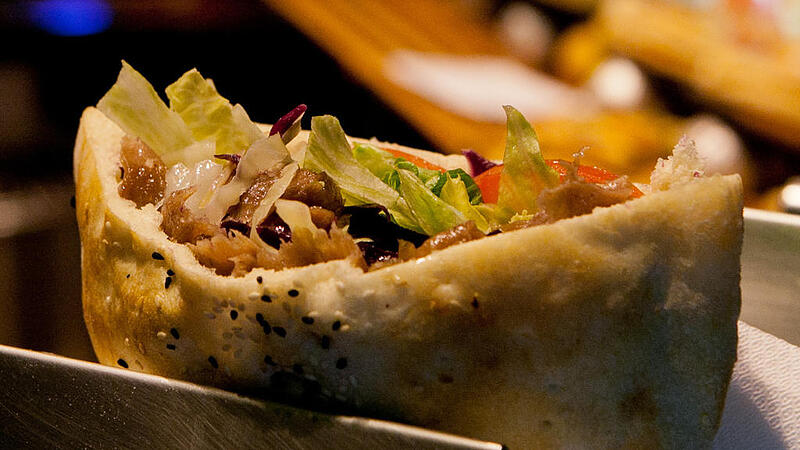Image: APA

Image: dpa
At the latest after the most recent kebab scandal, the subject of “mandatory labeling of origin” is back on the table, but continues to be rejected by restaurant representatives. On the other hand, at least part of the industry should agree to mandatory organic certification. There have been initial talks at ministry level, but many questions are still unanswered.
“Consumers must be able to rely on the fact that where organic is at the top, there is also organic in it,” says a statement from the Ministry of Health to the APA. “Even within the organic gastronomy and organic hotel industry, there are complaints that some establishments label the dishes incorrectly.”

Image: dpa
As “Der Standard” reported, corresponding talks are currently taking place between the Ministry of Health and the Ministry of Economics (including the State Secretariat for Tourism) on the basis of a draft by the organic advisory board, which is based in the Ministry of Social Affairs. According to this, a regulation should be on the table this year – but the ministries were reluctant to respond to APA requests.
Less organic because of complex certification processes?
The talks are just beginning, the Ministry of Health said. There are still many open questions in the State Secretariat for Tourism: “For example, there is concern that complex certification processes will lead to restaurateurs removing organic food from their menus. The result would then be ‘less organic’. Any additional costs are also in these times a potential challenge.”
According to reports, there should be “relief” at least for smaller companies, as the Ministry of Health confirms. According to “Standard”, companies that buy less than 10,000 euros organic per year should not have to be certified. To do this, they must report to the food authority.
Approval for the plans naturally comes from the organic economy. The association “BiowirtInnen” on Ö1 speaks out in favor of the certification requirement. Organic farming also welcomes organic certification. “Currently, there is no obligation for catering establishments in the out-of-home catering sector to undergo an independent organic inspection. It is high time that this control gap was closed,” said the Bio Austria association in a statement.
Mario Pulker, head of the gastronomy department at the Chamber of Commerce (WKÖ), on the other hand, is just as critical of organic certification as a basic indication of origin. In terms of bio, he referred to Ö1 on ongoing, strict controls and high penalties for violations.
27 cases of salmonella poisoning after kebab consumption
The top gastronomy representative fears that the additional costs for companies will be too high, also with a view to a general mandatory labeling of origin. This is an issue again after the recent kebab scandal. Spoiled chicken meat from Poland had led to 27 cases of salmonella poisoning across Europe and in Austria alone. One even ended fatally for a 63-year-old Carinthian. Instead of an obligation to label, stricter controls on imports and EU-wide uniform standards in animal husbandry should fix it, Pulker said on Friday.
Having to label every ingredient means too much bureaucracy, according to the restaurateur and WKÖ representative. Regional or seasonal products are often not available without restrictions. “What if it runs out when I have to fall back on another product,” asked Pulker. “There are so many big problems in practice.”
An indication of origin in gastronomy is not provided. The Greens would have wanted this, the ÖVP was against it. From September, however, as reported, there will be an indication of origin in communal catering such as canteens. As a result, this is also planned for processed foods in supermarkets.
In gastronomy, labeling is voluntary. Anyone who advertises meat from Austria has to reckon with controls. “If you say at the top that you sell meat from Austria, then the delivery notes will also be checked,” says Pulker. “That is a good thing.” In this way, landlords and consumers could choose what they want and what is possible with their wallets.
Animal welfare and animal health – lots of scope
The EU is currently giving Member States a lot of leeway when it comes to animal welfare and animal health. For Hendln, an occupation density of 42 kilograms is planned. Up to around 26 adult animals can be kept in one square meter. Austria is much stricter with 30 or 21 kilos in organic farms. That corresponds to 18 or 13 chickens per square meter. This is where Pulker starts his criticism. “It can’t really be the case in a European Union that one country has a higher population density for poultry than the other country. And then you compete with each other there afterwards.” In the interests of consumers, standardization is needed.
Pulker received backing from the Farmers’ Union. “It is now the turn of the EU Commission to ensure fair competitive conditions and, in particular, to ensure that people’s health is not willfully jeopardized,” said the President of the Farmers’ Union, Georg Strasser (ÖVP). When it comes to the labeling of origin, the positions of the WKÖ and the farmers’ association, which calls for “transparency on the plate”, differ. The “oekoreich” initiative also called on the WKÖ to give up its “resistance to an indication of origin”.
According to the Ö1 report, the Ministry of Agriculture said that the federal government in Brussels is working hard to raise the standards to an Austrian level. When it comes to meat production, Austria is only a small player in an EU comparison. The resistance of the large meat-producing member states, such as Poland, the Czech Republic, but also Germany, is inevitable. The kebab skewers that recently caused salmonella poisoning throughout Europe and not just in Austria came from Poland.
Source: Nachrichten




